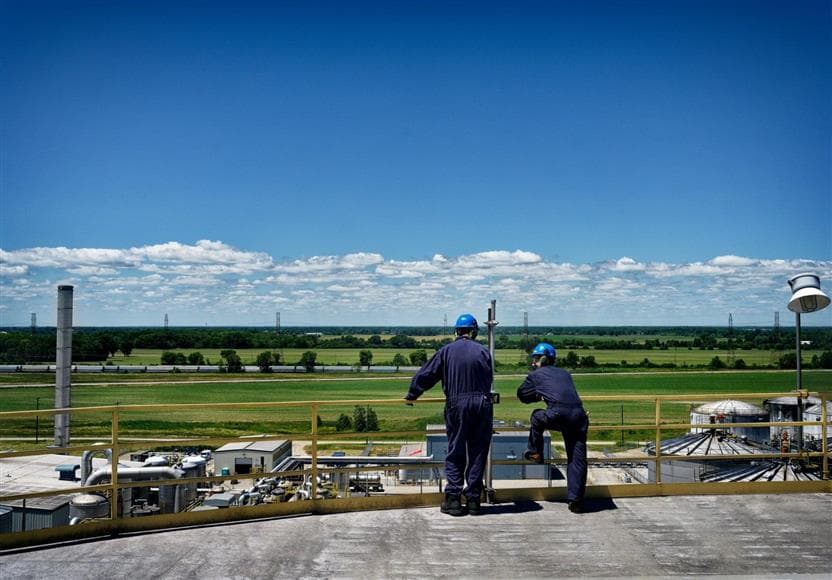Since 2006, Suncor has been a part of Canada’s renewable liquid fuels industry.
Ethanol from our St. Clair, Ont. plant gets blended into our Petro-Canada gasoline today and we’re researching even lower-carbon intensity ethanol for the future.
We’re advancing a portfolio of projects with universities and companies aimed at developing pathways to produce advanced renewable liquid fuels from waste, forestry and agricultural excess biomass, and refinery gases. These fuels have the potential to significantly reduce GHG emissions.
Ethanol: a cleaner burning, renewable resource
Ethanol production industry is expanding because of growing demand and government regulations that require fuels be blended with a percentage of ethanol to reduce the environmental impacts of vehicle emissions.
We operate Canada's largest ethanol facility — the St. Clair Ethanol Plant in the Sarnia-Lambton region of Ontario.
St. Clair Ethanol Plant
The plant opened in June 2006.
- Located in Mooretown, Ont., the facility is Canada’s largest ethanol plant and has a current production capacity of 396 million litres per year.
- The ethanol produced at St. Clair is blended into Petro-Canada gasoline.
- The plant currently uses 40 million bushels of corn annually, approximately 20% of Ontario's annual corn crop.
- The type of corn used as feedstock has traditionally been used to feed livestock. Once the starches are extracted from the corn to make ethanol, the remaining elements are used to make premium cattle feed and corn oil.
Other renewable fuels initiatives
Enerkem
Enerkem is a waste-to-renewable fuels and chemicals technology developer and producer. In addition to direct investments, we have seconded employees to Enerkem projects to provide operational support and increase operational discipline based on Suncor’s extensive experience.
Enerkem, Suncor and other partners announced in 2020 construction plans for the Varennes Carbon Recycling facility in Quebec that that will convert non-recyclable residual materials, as well as wood waste, into advanced biofuels and renewable chemicals.
The facility is currently under engineering development and early construction phase.
LanzaTech
LanzaTech’s carbon recycling platform uses novel gas fermentation technology to capture CO-rich gases and convert the carbon to fuels and chemicals.
We have partnered with LanzaTech for more than 10 years to support the development of their patented technology portfolio for potential use in our existing operations as well as next-generation biofuel plants.
LanzaJet Inc.
LanzaJet Inc. (LanzaJet) will produce sustainable aviation fuel (SAF) and renewable diesel using ethanol derived from waste streams. We are a founding investor of LanzaJet alongside Mitsui & Co., Ltd. and LanzaTech Inc. Shell and British Airways (International Airlines Group) also invested in Lanzajet in 2021.
These investments will help build LanzaJet’s commercial biorefinery in Georgia, U.S. and establish LanzaJet as a global leader in renewable fuels production for the aviation sector.
Alberta Zero Emissions Truck Electrification Collaboration
In June 2021, we announced a first-of-its-kind project, Alberta Zero Emissions Truck Electrification Collaboration (AZETEC), to design, manufacture and test long-range hydrogen fuel cell trucks. This 18-month pilot is an important first step to develop affordable commercial hydrogen transport fueling stations.







.jpg?mw=304&modified=20221012172840&hash=5845CC69DEC9C437DC778743F7C62858)